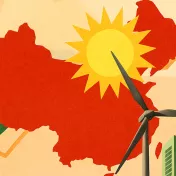It was only last year when the group of the 20 leading economies (G20) evoked hopes that it would eventually bring forward serious climate policy and climate finance. The Chinese G20 presidency had put its weight behind important agenda items in this direction and the German government promised that climate will become a priority topic under this year's German G20 presidency. However, since US president Trump took office, mood depressed. Germanwatch works with vehemence at multiple levels to ensure that the blockade strategy of the new republican US government proves to be unsuccessful.
The German Government will host the G20 summit in Hamburg on 7 and 8 July 2017. This summit is criticized by many - which is indeed justified for several aspects of the G20 states' policy. However, Germanwatch does not criticize the simple fact that these countries meet and aim for political agreement. Undoubtedly, the G20 are not legitimized to introduce new rules which apply for all countries - but due to their size and their economic power they bear a special responsibility to implement the rules which were agreed by the world community in the legitimate bodies of the United Nations, such as the 2030 Agenda or the Paris Climate Agreement.
This year's G20 summit is not only a huge challenge in terms of climate policy. Among others the presidents Trump, Putin and Erdogan are expected to come. There are growing nationalist and authoritarian tendencies in many G20 countries. Therefore, extraordinary alliances accompany the G20 process this year from the outset.
Already when the G20 foreign affairs ministers met on 16/17 February, a particularly broad alliance stood up, calling for an open society. The Chairmen and -women of the so called G20 engagement groups, ranging from business and science to non-governmental organizations and think tanks up to women and trade unions, signed a joint statement warning about the danger caused by nationalism and authoritarian regimes, highlighting the growing inequality and promoting a tolerant, democratic, open and integrative society. Besides VENRO and FUE as chairs of the Civil 20 –Germanwatch being a member of both organisations - the Federation of German Industries (BDI), the German Trade Union Confederation (DGB), the German National Council of German Women’s Organizations (Deutscher Frauenrat) and the German Development Institute (DIE) were amongst the signatories.
At the latest with the final declaration of the meeting of the finance ministers, which took place in Baden-Baden on 18 March, the obstructionist attitude of the US towards climate policy became apparent. In contrast to the prepared text and unlike the past years’ declaration, any reference to climate change challenges was missing. In consequence, Germanwatch requested the German G20 presidency in a press release to strategically deal with the blockade mentality of the US government: Until the meeting of the finance ministers in Washington in April and the G20 summit in Hamburg, the German Government needed a strategy for advancing the climate protection agenda - even without the US government, if necessary.
Meanwhile, a study commissioned by the German G20 presidency of the International Energy Agency (IEA) and the International Renewable Energy Agency (IRENA) shows that the US harms itself should it stick to its climate policy blockade attitude. The studies clearly show that the worldwide phasing out of coal, oil and gas is worthwhile and pays off. Germanwatch was on site at the presentation of the study on 20th March in Berlin and highlighted in a press release afterwards that the study was an urgent appeal on the G20 to action. "Upscaling investments for the global energy transition boosts the economy and creates millions of new jobs. The G20 bear the responsibility to implement the global energy transition right now", says Lutz Weischer, team leader international climate policy at Germanwatch, in a press release. However, Germanwatch criticizes that the study with its 2°C scenarios does not reflect the tightened-up goals of the Paris Climate Agreement. Furthermore, Germanwatch calls for the G20 to now agree on specific action steps, such as submitting ambitious long-term strategies for decarbonisation by 2050 as soon as possible, setting a precise, near-term end-date to phasing out fossil fuel subsidies and starting the process for a gradual introduction of minimum prices on CO2 emissions through taxes, levies or emissions trading systems - even if this would cause conflicts with the US.
These requests were emphasized through another joint statement of the G20 business (B20), think tanks (T20) and civil society (C20) engagement groups. The statement was facilitated by Germanwatch to support the German G20 presidency in moving with an ambitious climate agenda. The appeal, published on 22 March, calls on the G20 states for implementing the Paris Agreement in their energy and climate policies in a way that it leads to a new model of global wealth and welfare. This implies that the G20 submit concrete low-carbon development plans up to 2050 until 2018, ratcheting up the national emission mitigation efforts in the light of the Paris Agreement and that industrialised countries mobilise the promised annual 100 billion US dollars for financing climate change adaptation and mitigation in developing countries by 2020. In addition, the signatories demand a CO2 price signal, fossil fuel subsidies phase-out until 2025 and a clear climate-compatible regulatory framework for financial markets.
Furthermore, the G20 should assume more responsibility for their contribution to climate change by supporting the vulnerable countries, which are only minor polluters, in the fight against the global climate crisis - so the bottom line of a joint blog post by Christoph Bals, Policy Director at Germanwatch, and Peter Höppe, Chairman of the Munich Climate Insurance Initiative, which has been published at klimaretter.info and the Germanwatch homepage. The authors suggest that the G20 states should agree on strengthening climate risk insurance schemes on their summit in July in Hamburg. In detail, the G20 should organise a process that particularly fosters and expands regional insurance pools. Furthermore, Bals and Höppe request the G20 states to assist the poorest countries in making use of climate risk insurance instruments. Investments in transparent national structures should ensure that the funds disbursed actually reach the people. Since many G20 countries are themselves strongly affected by climate change, Bals and Höppe promote national insurance pools also in those countries - i.e. the bundling of risks of provinces, federal states or cities of the G20 states.
Due to the extraordinary alliances the climate policy asks to the G20 reached a broad public and increase the pressure on the German G20 presidency to further pursuing an ambitious climate agenda. Given the growing nationalist and authoritarian tendencies, Germanwatch continues to advocate not only in the climate sector that the G20 take their particular responsibility for solving the global challenges.
- With financial support by Stiftung Mercator. The Author and Germanwatch are responsible for the content. -
Details to the initiatives mentioned in the article above as well as further information about the G20 summit: www.germanwatch.org/en/g20




